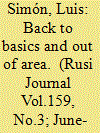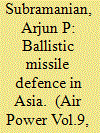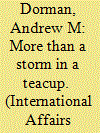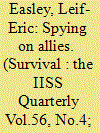|
|
|
Sort Order |
|
|
|
Items / Page
|
|
|
|
|
|
|
| Srl | Item |
| 1 |
ID:
132083


|
|
|
|
|
| Publication |
2014.
|
| Summary/Abstract |
As Allied combat forces return from Afghanistan, Russia's annexation of Crimea has reminded NATO that the security of a rules-based international system in Europe cannot be taken for granted. Efforts to reassure Allies and partners in Eastern Europe have thus become a top priority. This, however, should not lead the Allies to turn their backs on broader, global geostrategic developments - particularly at a time when Asia is emerging as the world's economic and geopolitical centre of gravity. If the West is to prosper in a changing world, argues Luis Simón, it should be able to both defend Europe and project security globally.
|
|
|
|
|
|
|
|
|
|
|
|
|
|
|
|
| 2 |
ID:
132479


|
|
|
|
|
| Publication |
2014.
|
| Summary/Abstract |
The one continent where ballistic missiles have proliferated tremendously is Asia. There are some important factors that have been, and are, contributing to such a trend in the region. Firstly, the demand for the ballistic missile as it is a relatively cheap weapon to develop and deploy compared to a large and sophisticated air force. Also, this weapon is hard to counter even by the most technologically advanced countries. Secondly, the existing geo- political make-up where confrontation is between states that are at opposite poles of the power spectrum, where the weaker side finds such weapons most suitable to counter a technologically superior adversary. Thirdly, the ready availability of the technology and vital components through both legal and clandestine means. These factors have enabled states like North
Korea with a less than meagre technology base to adapt the technology, of course, with tremendous assistance, to develop ballistic missile capability. With the rapid proliferation of these weapons in Asia, countries facing this threat have been looking for ways to counter it. Most have turned to some level of Ballistic Missile Defence (BMD). This paper attempts to study the ballistic missile threat and the missile defence efforts of the US and its allies in East Asia, China, Israel and India.
|
|
|
|
|
|
|
|
|
|
|
|
|
|
|
|
| 3 |
ID:
131445


|
|
|
|
|
| Publication |
2014.
|
| Summary/Abstract |
In September 2014 the people of Scotland will vote on whether to become an independent nation, with the defence and security of Scotland proving to be one of the more vociferous areas of debate. This article argues that defence and security implications of this referendum are far more fundamental than either the 'yes' or 'no' campaigns have admitted. It makes four points. First, it suggests that the Scottish government's plans for defence and security in NATO and the EU are at odds with its proposed armed forces and that Scotland may well find itself having to make far greater commitments to defence to assure its allies. Second, it argues that a vote for independence will represent a game-changing event for the remainder of the United Kingdom's defence and security, which will have significant consequences for the United Kingdom's partners and allies in NATO, the European Union and elsewhere. Third, the article contends that even a vote against independence will have a long-term impact, in that the 'West Lothian question' and Scottish support for nuclear disarmament influence the 2015 Strategic Defence and Security Review. Finally, the article highlights how this issue has revealed weaknesses in the think-tank and academic communities, particularly in Scotland. The independence vote does, therefore, represent 'more than a storm in a tea cup' and thus there needs to be far greater engagement with these issues within the United Kingdom and elsewhere
|
|
|
|
|
|
|
|
|
|
|
|
|
|
|
|
| 4 |
ID:
132473


|
|
|
|
|
| Publication |
2014.
|
| Summary/Abstract |
Although some programmes crossed lines of propriety, US surveillance of partners did not constitute a breach of trust.
The United States is accused of monitoring the communications of other countries and collecting data on Internet users worldwide, following disclosures made by Edward Snowden, a former National Security Agency (NSA) contractor. US President Barack Obama implied that he did not order the NSA programmes for listening in on over 35 world leaders, including not only those of threatening states, but also those of allies, friendly countries and the United Nations.
|
|
|
|
|
|
|
|
|
|
|
|
|
|
|
|
|
|
|
|
|